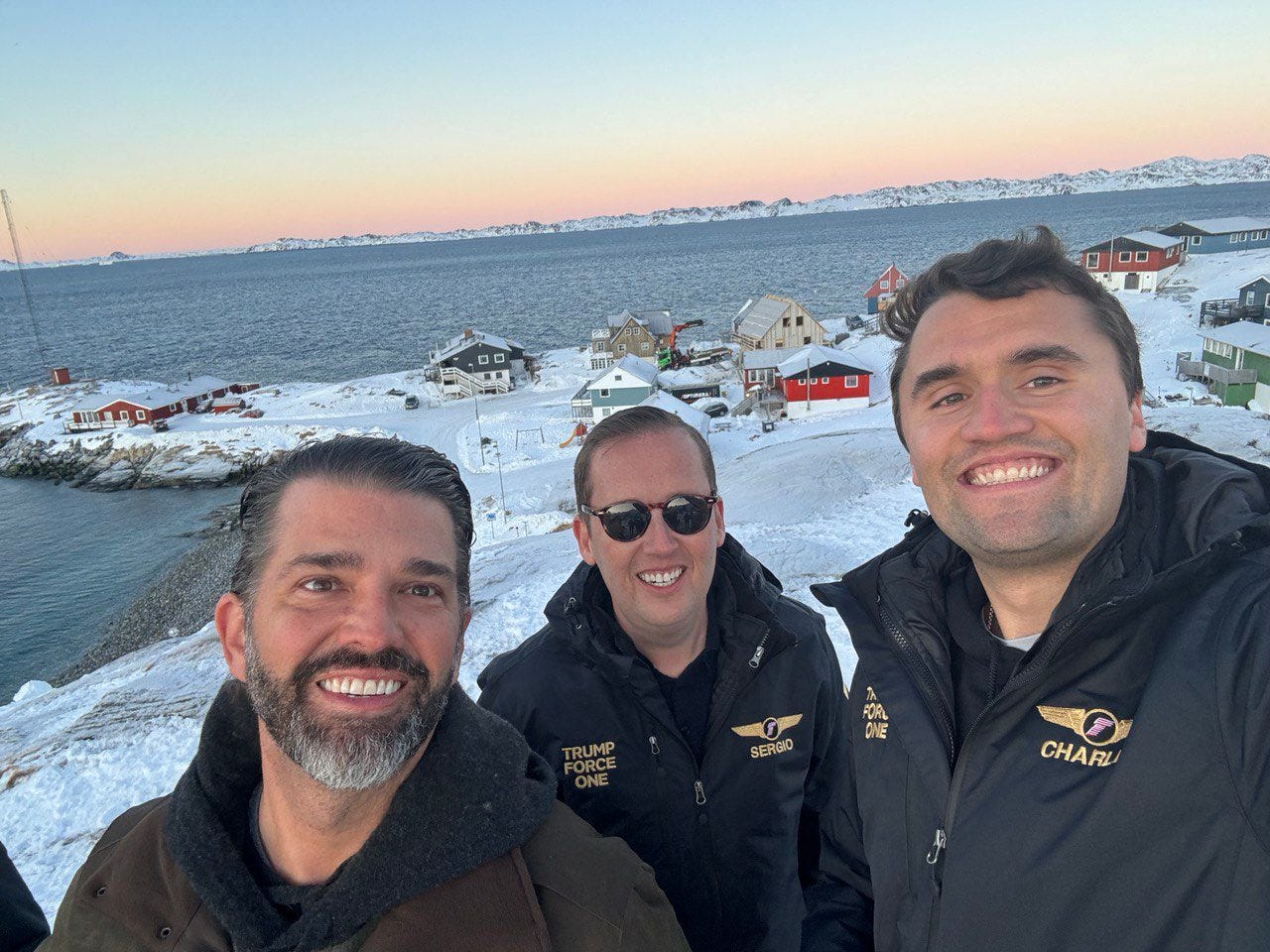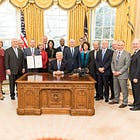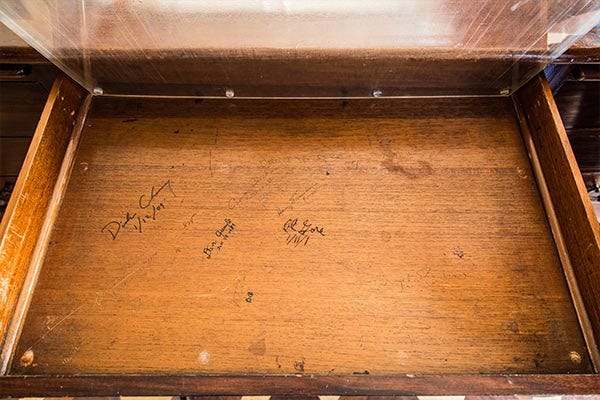Is Trump serious about buying Greenland?
What we’ve learned during the transition, Part II
Good morning! It’s Wednesday, January 8, 2025. Inauguration Day is 12 days away. Thanks, as always, for waking up to politics.
Quick plug: I’ll be on a panel at the American Enterprise Institute (AEI) this morning to discuss the chaos that was the 118th Congress and what to expect in the 119th. You can click here to stream at 10 a.m. ET if you’re interested, or to find the details to stop by if you’re local.
This week, as Donald Trump prepares to be sworn in, we’re taking a look at the main themes of his transition and what they can tell us about the dynamics to expect in 2025.
As I wrote on Tuesday, there are four main qualities that have characterized the Trump transition from November to January:
Impressive speed
Factional strife
A diminished opposition
A lot of trolling
I covered the first two yesterday. We’ll tackle the last two today. Before diving in, I should note that I previously rounded up my takeaways on Trump’s Cabinet picks, back in late November. Just wanted to mention that since I’m focusing less in these pieces on individual appointments — which are obviously an important part of analyzing a transition — and more on broader political dynamics, to make sure I don’t repeat myself. But if you want to read about where the specific picks fit into all this, I’ve got you covered:
OK, let’s dive in!
3. A diminished opposition. Yesterday, the first bill to pass either chamber in the Republican-controlled 119th Congress was approved by the House: the Laken Riley Act, which would require federal authorities to detain (and potentially deport) undocumented migrants charged with burglary, theft, and other crimes.
Democratic leadership didn’t urge their members to vote for or against the measure, but the party’s “whip notice” did mention that the top Democrat on the relevant committee “strongly opposes” the bill. 48 Democrats crossed party lines to vote for it anyways, up from 37 last year. The bill now goes to the Senate, where it has a good shot at surpassing the 60-vote filibuster threshold: Sen. John Fetterman (D-PA) has signed on as a co-sponsor; Sens. Gary Peters (D-MI) and Jon Ossoff (D-GA) have said they will support it; and Sens. Ruben Gallego (D-AZ) and Elissa Slotkin (D-MI) backed a previous version.
It’s hard to imagine, had this vote been in January 2017, that an equally large number of Democrats would have cast their first votes out of the gate post-election in favor of a Trump-backed immigration bill. But the politics of 2025 are very different from the politics of 2017, and Democrats are slowly beginning to realize it.
The 2024 election, in addition to everything else, demolished a lot of theories that had previously dominated Democratic politics: the idea that Trump was a fluke; the idea that his opponents control a popular mandate (and therefore succeed as long as more people vote and only lose when institutions like the Senate or the Electoral College work against them); the idea that voters of color are more animated by racial identity than class identity; etc.
Another big one was the notion that Democrats could “resist” Trump away: win by simply declaring him outside the normal bound of politics and by demanding he be excised from mainstream media and social media, as if he didn’t command a loyal (near-majority) base of followers who would simply follow him to new media streams if he was banned/opposed/dismissed on those other ones.
After a third straight contest where he was elected or almost elected president, deciding he is outside the mainstream is no longer (or, really, never was) a workable strategy: voters have too clearly said otherwise. So now you see a party that is regrouping from protesting Trump at every turn to reckoning with his appeal for the first time. What that process will look like isn’t exactly clear yet, which leads to the somewhat listless vibe of the party right now, as it splinters indecisively into different factions.
But it will almost certainly result in an opposition party in Trump 2.0 that is, at the very least, less uniformly oppositional and more open to working with him on certain key issues, such as — to circle back to where we started — immigration, which 35% of the country wanted to decrease in 2017 and which 55% want to decrease now.
At the same time, Joe Biden has all but disappeared from public discourse, ceding the stage to Trump for much of the transition, leaving the Democrats without a central voice (and even the race to chair the party has been fairly quiet).
Trump will appear further strengthened as organizations in the business world go through the same conciliatory evolution. Corporate kowtowing has been a striking through-line in the transition, from ABC News settling a defamation suit with Trump to CEOs flocking to Mar-a-Lago and donating to his inaugural to Amazon’s new Melania Trump documentary to Meta’s move away from fact-checking.
“EVERYBODY WANTS TO BE MY FRIEND!!!” Trump memorably put it on Truth Social last month.
Some of this may sound like the usual attempts by companies to ingratiate themselves with a new administration, but the important thing to note here is that this sort of ingratiation didn’t happen in Trump’s first term. Meta, for example, started fact-checking in the first place after the 2016 election — showing that, even in light of Trump’s initial victory, the firm was more afraid of progressive backlash. Now that Trump has won again (and, for the first time, won the popular vote), that is very much not the case. A second “Resistance” has not materialized.
4. A lot of trolling. When I was first planning out these posts, this was the spot where I was going to discuss an interesting — but ultimately, it seemed, unserious — pattern of new rhetoric that Trump has been testing out since the election. Immigration, tariffs, taxes? That’s all old hat. But the one big thing he’s added to his repertoire during the transition has been a notably expansionist impulse, musing about adding a 51st state in Canada, annexing Greenland as a territory, and wresting back control of the Panama Canal.
My plan was to discuss this under the category of transition “trolling,” since it seemed like those ideas were mostly just grist for the MAGA meme mill:
Maybe not.
At a press conference yesterday, Trump didn’t exactly seem to be kidding when he talked repeatedly about the “artificially drawn line” between the U.S. and Canada and the “national security purposes” served by taking over the Panama Canal (to counter China) and Greenland (to counter Russia).
Just take a look at some of the coverage of the presser.
All of that is true, but it isn’t the headline I’d write from the press conference. As I’ve written previously, Trump has a long-standing practice of trying to maintain maximum flexibility — in all situations — and almost reflexively refusing to rule possibilities out, no matter how unlikely, when reporters ask him about them.
That’s exactly what happened here. A reporter asked if Trump would rule out using the military to annex Greenland or the Panama Canal, and Trump responded, “I’m not going to commit to that.” (He did rule out an invasion of Canada.) And that comment, as these sorts of Trump comments always do, led to countless headlines, even though the possibility of military force wasn’t really raised by Trump: it was raised by a reporter, and then not-knocked-down by Trump.
So, until given reason to think otherwise, I’m keeping this discussion in the “trolling” category.
It seems to me that Trump is more keeping these ideas in the air in order to extract a better trade deal from Canada, lower shipping fees from Panama, and more advantageous arrangements in the Arctic, and to mock outgoing Canadian Prime Minister Justin Trudeau, who Trump has taken to calling “Governor.” (The president-elect has also urged hockey icon Wayne Gretzky to run for Trudeau’s position, another idea that seems more trollish than serious.)
In any event — unless he actually uses military force — there is no clear way for Trump to turn these proposals into reality: Denmark (which controls the island) says Greenland is not for sale. (The same thing they said during Trump’s first term, when Trump also raised this idea and then abandoned it without achieving anything.) Panama says they’re keeping the canal. Even the leader of Canada’s Conservative Party — the so-called “Canadian version of Donald Trump” — says no to statehood.
To take things a step further, it’s also unclear what the political advantage for Trump would be of, say, making Canada the 51st state. Sen. Lindsey Graham (R-SC) put out a tweet saying that his only issue with the January 6th electoral vote count was that “they skipped Canada” — again, trolling — but it’s not like Trump and Graham would be happy if Canada was added to the voter rolls. One poll found that Canadians favored Harris, 64%-21%, in the 2024 election; add the 50-odd electoral votes that Canada’s 40 million citizens would merit them to Harris’ tally and it’s her win, not Trump’s, that would have been certified on Monday, another reason not to take the push seriously.
A good coda to these discussions came this week, when Donald Trump, Jr. made a point to visit Greenland, with Trump ally Charlie Kirk and incoming White House personnel director Sergio Gor — both wearing “Trump Force One” jackets — in tow. (That’s the photo at the top of the newsletter.)
Some speculation was bandied about that Junior was going to be meeting with Danish government officials — which Trump stoked by posting that his “Reps” had landed in Greenland. In the end, though, a source told Semafor that the visit had been organized for Trump Jr. to “shoot some fun video content for podcasting.”
A perfect metaphor for a push that seems more like a play for content (and some lesser policy demands) than anything else. Either that, or I’ll be eating my words when the great Danish-American War of 2025 kicks off.
More news to know
KTLA: Palisades Fire in Los Angeles scorches 2,921 acres; many homes burned
USA Today: In exclusive sit-down, Biden reveals his biggest regret and the compliment Trump gave him
CBS: Judge in Trump documents case temporarily blocks release of special counsel Jack Smith’s report
CNN: NY appeals court rejects Trump’s emergency request to delay Friday hush money sentencing
ABC: Trump DOJ officials may have tried to influence 2020 election through media leaks: IG report
Reuters: Trump: I will revoke offshore oil, gas drilling ban in vast areas on day one
The Guardian: Soldier who exploded Cybertruck in Las Vegas used ChatGPT to plan attack
AP: US shifts $100 million in military aid from Israel and Egypt to Lebanon to bolster ceasefire
The day ahead
President Biden will return to the White House from Los Angeles, California, where he spent the night.
Vice President Harris will ceremonially sign the drawer of her desk in the Eisenhower Executive Office Building.
Neither the House nor the Senate have votes scheduled, as the late President Jimmy Carter will continue lying in state at the Capitol.
The Supreme Court has no oral arguments scheduled.










Your angle on the Greenland/Panama thing is a great demonstration of why this newsletter is valuable. UNlike the legacy media folks whose breathless headlines you displayed, you're correctly pointing out that Trump just kinda doesn't like "ruling things out" and that him not ruling out taking over the Panama canal when randomly asked about it by a reported isn't really news.
Frankly, I think you're putting lipstick on a pig here--little of what the president-elect is doing now is remotely what we have traditionally considered presidential. You are giving him a pass.
On the Laken Riley bill--I take your point about the Democrats realizing their approach to immigration has not reflected the will of many citizens. But this bill allows, as Hakeem Jeffries pointed out, for the deporting of people who have been accused but not convicted of a crime. I will be surprised if there is not going to be some litigation around this in the future.
What we should be doing is seeking some kind of comprehensive immigration reform, something a majority of Americans have consistently called for. Instead, we get laws like this or proposals for mass deportations (the talk of which has suddenly dried up--wonder why?). Such reform would be much more presidential and much more useful for the country than what we have now.
I served in an armored division in the Gulf War. I don't think it's appropriate to make light of any possibility of military action.